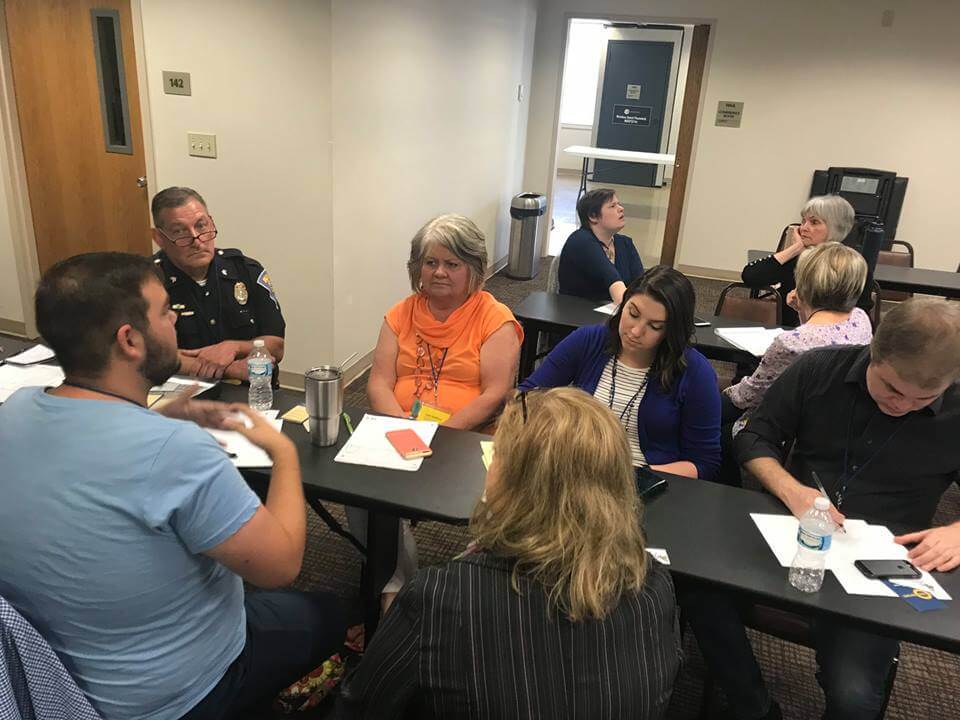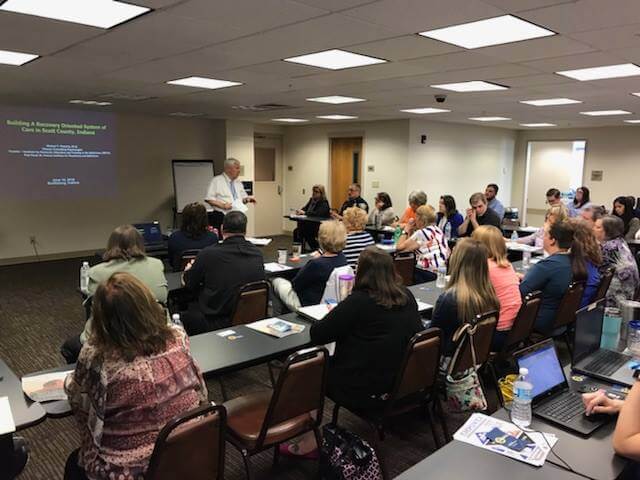Recovery Oriented Systems of Care (ROSC) is a relatively new concept in this area of the country. The Get Healthy Scott County (GHSC) Leadership Team visited the city of Findlay in Hancock County, Ohio, last September to learn how their community implemented ROSC to address community challenges caused by substance use disorder. Their community was mentored by Michael Flaherty, Ph.D., a Clinical Psychologist with more than 36 years of practice and a pioneering leader in building a science of recovery.
Last week at the Mid-America Science Park in Scottsburg, GHSC hosted this national ROSC expert, who over the past 10 years he has spoken in 46 states on recovery focused care, and is a regularly invited adviser to the White House Office of National Drug Control Policy where he served on its National Heroin Task Force for overdose prevention and helped develop the first National Plan to address the opioid epidemic in America. Indiana was his 47 state to train in ROSC, with Scott County being the VERY FIRST Indiana community to learn from his expertise.
He shared a comprehensive definition of addiction, “… a chronic, relapsing brain disease that is characterized by compulsive drug seeking and use, despite harmful consequences. It is considered a brain disease because drugs change the brain; they change its structure and how it works. These brain changes can be long lasting and can lead to many harmful, often self-destructive, behaviors,” according to the National Institute on Drug Abuse.
He added a simpler definition that, “Addiction is an illness begun as voluntary but evolves into neurological changes in the brain that weaken volitional control.”
The 50 workshop attendees learned that a Recovery Oriented Systems of Care (ROSC) is a network of formal and informal services developed and mobilized to help attain and sustain long-term recovery for individuals and families impacted by substance use. A ROSC in not a local, state, or federal treatment agency but a macro-level organization within the community.
He shared, “We have a science of pathology, but what we’re building with ROSC is a science of recovery. When dealing with substance mis-use, it’s vital to first build relationships. By giving extra attention to relationships, we’re exponentially increasing the odds of successful recovery.”
Among Indiana’s rural communities, Scott County is a recovery leader. After next month’s training, Scott County will have trained 43 Peer Recovery Coaches, more Peers per capita than any other county in the state.
Numerous times throughout the training, Dr. Flaherty expressed his amazement, “What Scott County has done with a totally volunteer base is nothing less than a miracle and can be a model for other communities!”
Some individuals may go to agencies for treatment, but they recover in the community. Flaherty’s workshop helped to ignite and engage community members involved in participating in individuals’ recovery. He stressed that our goal should be to help them stay in recovery, free of stigma. He said that the biggest barrier to having a ROSC community is stigma, defined as a mark of disgrace associated with a particular circumstance or quality.
Michelle Korty, Executive Director of Scott County’s crisis pregnancy center, CRADLE, said her favorite Flaherty quote was, “… trauma trumps addiction and mental health,’ something she has always believed needs to be addressed when treating the whole person.
GHSC Coalition will continue to keep the community informed about further plans to implement ROSC in Scott County.
The Leadership Team would like to thank the Great Lakes Addiction Technology Transfer Center (GLATTC) for sponsoring the full day training.


